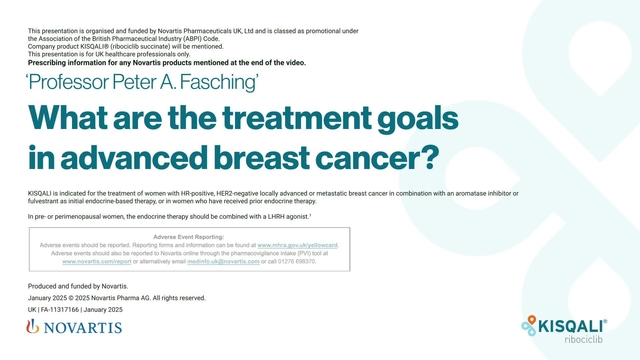

Indications:1
KISQALI is indicated for the treatment of women with hormone receptor (HR)-positive, human epidermal growth factor receptor 2 (HER2)-negative locally advanced or metastatic breast cancer in combination with an aromatase inhibitor or fulvestrant as initial endocrine-based therapy, or in women who have received prior endocrine therapy
In pre- or perimenopausal women, the endocrine therapy should be combined with a luteinising hormone-releasing hormone (LHRH) agonist
KISQALI is not recommended to be used in combination with tamoxifen.
Click the play button below to watch a video from Professor Peter Fasching
Join Professor Fasching as he explores treatment goals in aBC, discussing the latest updates to treatment outcomes that have been seen with the CDK4/6i pipeline.
The most common adverse reactions (ARs) (reported at a frequency ≥20%) in the pooled dataset for which the frequency for KISQALI plus any combination exceeds the frequency for placebo plus any combination were neutropenia, infections, nausea, fatigue, diarrhoea, leukopenia, vomiting, headache, constipation, alopecia, cough, rash, back pain, anaemia and abnormal liver function tests.1
aBC, advanced breast cancer; AR, adverse reaction; CDK4/6i, cyclin-dependent kinase 4/6 inhibitor; HER2, human epidermal growth factor receptor 2; HR, hormone receptor; LHRH, luteinising hormone-releasing hormone.
Reference
KISQALI® (ribociclib) Summary of Product Characteristics.
UK | January 2025 | FA-11331122
Adverse events should be reported. Reporting forms and information can be found at www.mhra.gov.uk/yellowcard. Adverse events should also be reported to Novartis online through the pharmacovigilance intake (PVI) tool at www.novartis.com/report, or alternatively email [email protected] or call 01276 698370.


